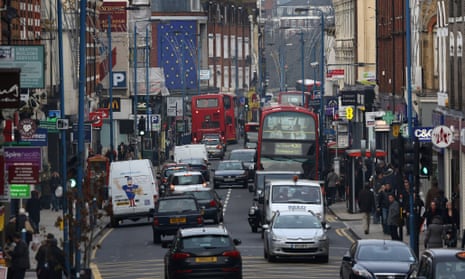Green campaigners, pollution experts and the mayor of London have called on government to increase taxes on diesel fuel to tackle dirty air in UK cities.
They say a change is needed to the system of taxation because it currently favours diesel vehicles despite their having a much more severe air pollution impact than petrol cars.
Boris Johnson laid out plans on Tuesday for an effective doubling of the congestion charge for diesel cars within certain areas of London, to around £20, and said he was lobbying central government for a change in taxation. Fuel taxes on petrol and diesel are the same despite the latter giving higher miles per gallon, meaning diesel works out cheaper in taxation per mile travelled.
But diesel results in far higher air pollution than petrol, because the method of combustion means bigger sooty particles are emitted. The particles - some so big they can be visible to the naked eye - cause respiratory problems, and are especially harmful to young children, older people and susceptible adults, such as those with respiratory problems.
Environmental campaigners including Clean Air in London, Friends of the Earth, Greenpeace, Client Earth, as well as the the Green Party, Labour and the thinktank IPPR have all called for a reconsideration of fuel taxes given the health problems associated with the lower-taxed fuel.
Simon Birkett, founder and director of Clean Air in London, told the Guardian the problem was now acute and must be dealt with: “Successive governments have incentivised the use of diesel vehicles, especially through company car taxation, even though they have known for over ten years that doing so was killing people. We need action now to ban carcinogenic diesel exhaust from the most polluted places by 2020 with an intermediate step by 2018 and an inquiry to discover how this public health catastrophe happened in the first place.”
Client Earth, another environmental pressure group, said that higher taxes on diesel relative to petrol should be considered urgently, together with reform of vehicle excise duty and company car tax. “It needs to happen as part of a comprehensive plan to tackle diesel pollution in the shortest time possible,” a spokesman said.
The IPPR thinktank said: “[Current] taxes do not reflect where a car is driven, or at what time of day. There are undoubtedly significant problems. Diesel vehicles are the most polluting.”
Frank Kelly, a professor at King’s College London, told the Guardian: “Diesel cars have to date been regarded as the ‘green’ option because they appear to offer better fuel consumption and hence CO2 emissions than petrol cars. This image of diesel cars however is wrong as they emit more harmful air pollutants, such as nitrogen dioxide and particulate matter. Given the shortcoming of diesel vehicles a sensible option would be discourage their use through a higher fuel taxation.”
Under Johnson’s plans, from 2020, all drivers of diesel vehicles, and petrol cars registered before 2006, will have to pay an extra £10 to drive into central London on top of the existing congestion charge, as part of his ‘air quality manifesto’, launched on Tuesday night. Only those diesel vehicles that meet the EURO6 emissions standard will be exempt from the charge.
Caroline Russell, spokeswoman on local transport for the Green Party, said: “Policy has... failed to keep up with a growing body of evidence that shows that the reality of diesel performance in the stop-start city-driving situation is nothing like that achieved on a test track and increasing awareness of the damaging impact of diesel particulates on air quality and human health.
“Government and local authorities must act fast to protect our health from the effects of diesel pollution and use all measures at their disposal - this should include working towards a diesel ban and removing fuel duty incentives.”
RAC Foundation director Professor Stephen Glaister said: “This isn’t quite a miss-selling scandal, but for years ministers took their eye off the ball and encouraged drivers to buy diesels to help fight climate change. That has come at a cost: local air pollution. Today 10 million cars in Britain are powered by diesel engines - a third of the total.
“Part of the problem is regulation. In laboratory conditions diesel cars have met strict test criteria. Unfortunately that performance hasn’t been matched on the road and now we have a significant health issue because of the dash for diesel.”
A spokeswoman for the Department for Food, Rural Affairs and the Environment did not comment on whether diesel taxation should be reviewed but said: “Local authorities also have powers to introduce low emission zones and other access control schemes to reduce emissions on the most polluted roads. This could include an age restriction on certain diesel vehicles - the government is not considering a blanket ban on the production and sale of diesel vehicles.”
A spokesman for the Society of Motor Manufacturers and Traders said: “Any changes [to fuel tax] should reflect national UK-wide issues rather than address localised environmental concerns, however valid those may be. Vehicle Excise Duty continues to be an effective incentive for consumers to consider the environmental benefits of lower emission vehicles.”
The Treasury did not comment, but has previously told the Guardian that the taxation rates of diesel and petrol-driven vehicles are equal and there are no plans to change them.

Comments (…)
Sign in or create your Guardian account to join the discussion